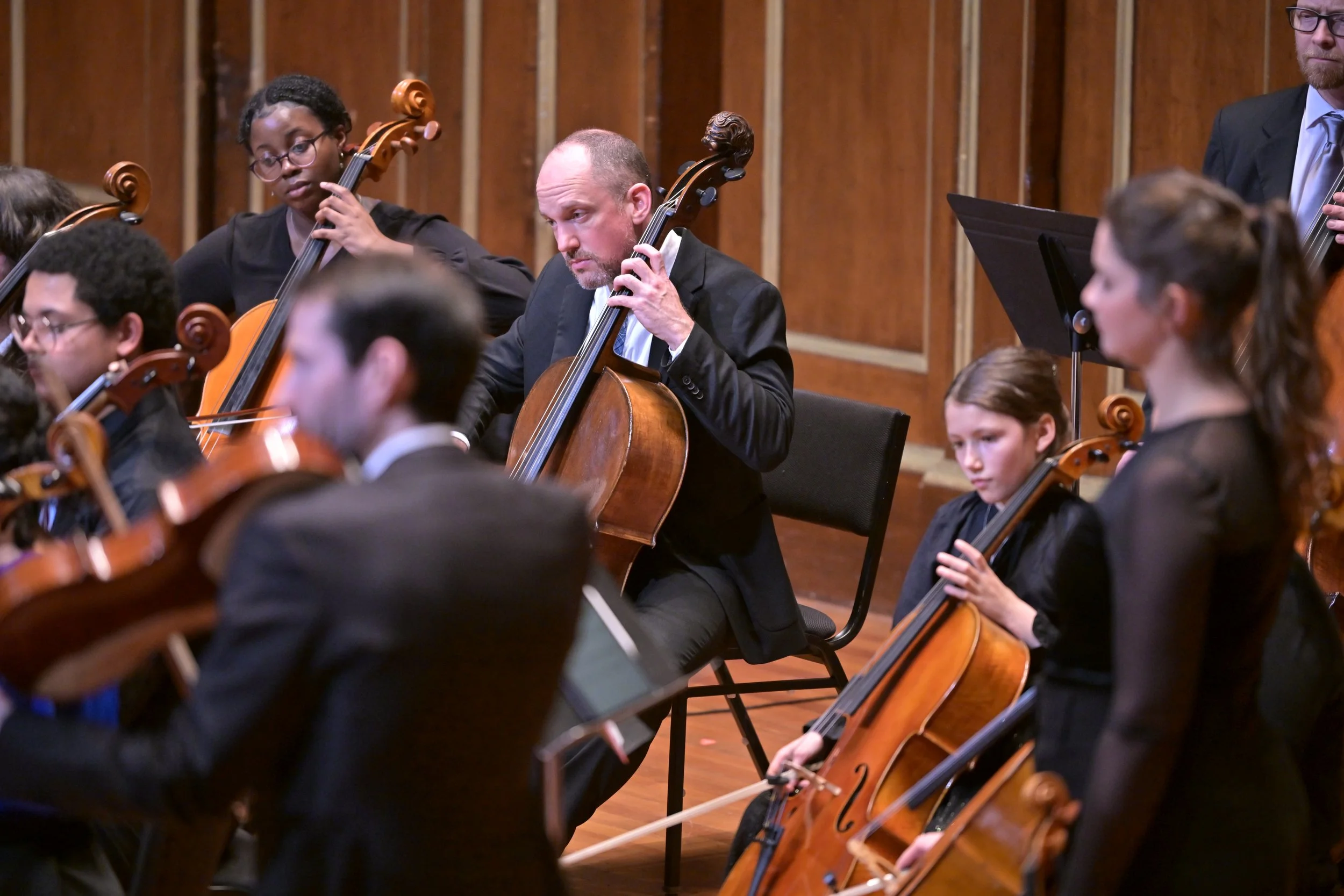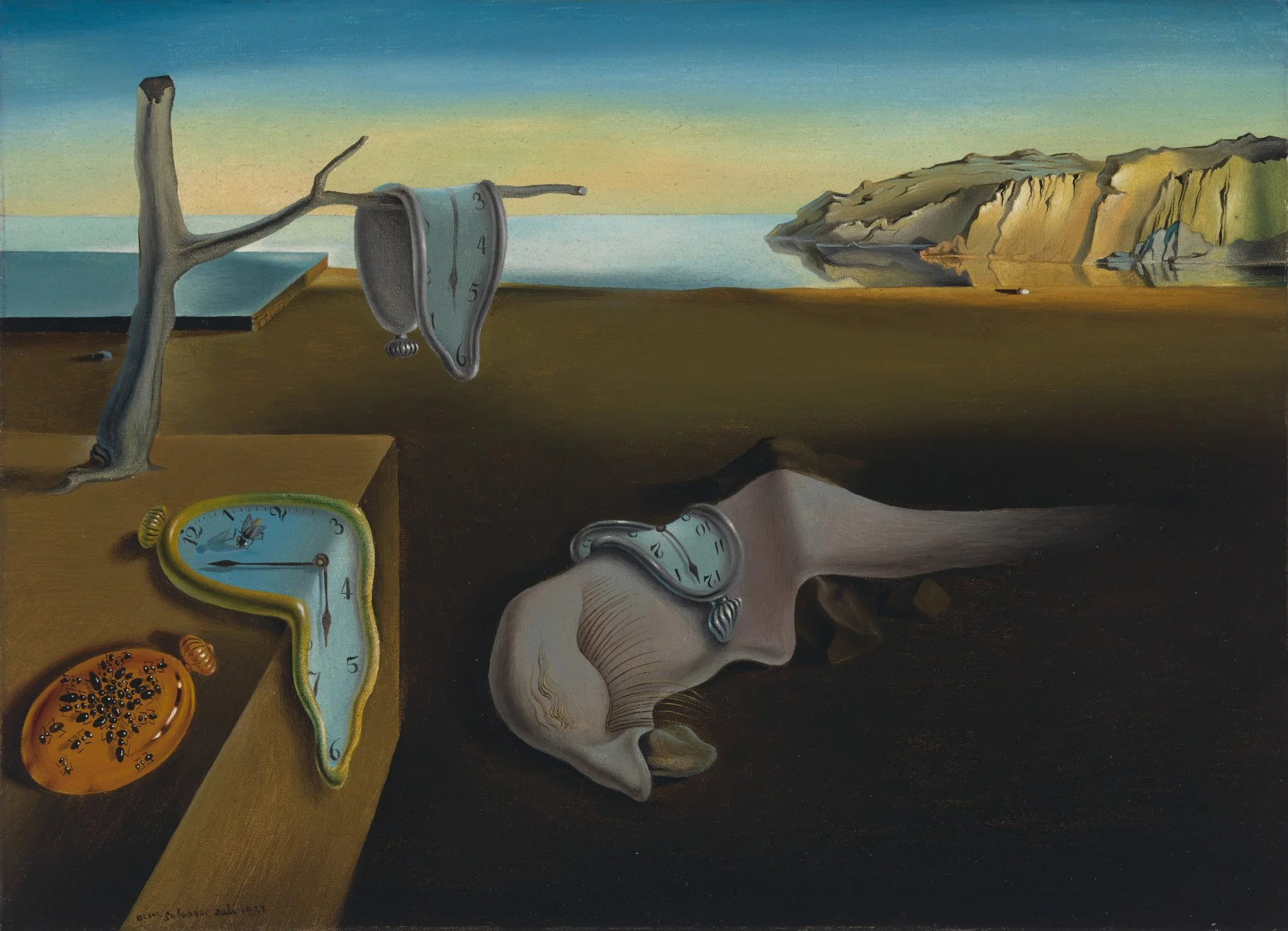It’s hard to believe I’m already entering my fourth season as a full-fledged Crier, and every day I feel proud to be part of a group that is truly unlike any other orchestra.
Then Is Now: "An Exercise in Nostalgia"
Then Is Now
Saturday, September 20, 2025 | 7:30 PM | NEC’s Jordan Hall
🎟️ Tickets available here
Memory doesn’t sit still. It bends, blurs, and blooms — sometimes bringing the past into sharp focus, other times melting it into something dreamlike. A Far Cry’s season premiere, Then Is Now, is an exploration of nostalgia: how music remembers, transforms, and reawakens what was once felt.
The original working title for this program was The Persistence of Memory, inspired by Dalí’s painting of melting clocks. That surreal image of time slipping, warping, and folding into itself resonates deeply with the music we’ll share. Each piece looks backward to move forward, turning recollection into revelation.
Salvador Dalí: The Persistence of Memory, 1931
Caroline Shaw | Punctum
Shaw calls this work “an exercise in nostalgia.” It deconstructs a centuries-old chorale most famously used by Bach, a melody that has resurfaced over time in protest songs and even Paul Simon’s American Tune. Like a photograph with some small detail that pricks the memory, Shaw’s fractured treatment makes us feel how one sound can trigger floods of emotion, collective and personal.
Komitas | Armenian Folk Songs (arr. Aslamazyan)
Komitas devoted his life to collecting and preserving Armenian folk music, cataloguing thousands of songs that otherwise might have been lost to history. These miniatures are touchstones of cultural memory, carrying voices across time. In them, nostalgia is not just personal — it is national, communal, and enduring.
Osvaldo Golijov | Tenebrae
Golijov’s Tenebrae hovers between despair and hope, light and shadow. A significant musical touchstone for our ensemble, the work draws on François Couperin’s Troisieme Leçon de Ténèbres, Golijov. Golijov composed it in the aftermath of both political violence and a trip to the planetarium with his son, where they “saw the Earth as a beautiful blue dot in space.” The music shifts depending on how closely you listen: from a distance, it offers a luminous, almost serene surface, but up close it reveals a depth of pain. Here, nostalgia emerges through a lens of longing and loss.
Benjamin Britten | Variations on a Theme by Frank Bridge
Britten transformed a theme by his beloved teacher into a dazzling set of variations, each one refracting its original inspiration through a new lens. At once tribute and invention, this piece is nostalgia made creative — honoring the past while creating something wholly new. It’s also a work close to A Far Cry’s heart: it anchored our Grammy-nominated album Visions and Variations, and we’re thrilled to bring it back to life in this concert.
A Far Cry’s Own Memory
This program doesn’t just reflect on the memory within each composition — it’s also a mirror of A Far Cry’s journey. From our early collaborations with Caroline Shaw, to programming Golijov in our earlier seasons, to recording Britten eight years ago, Then Is Now feels like a homecoming. As we approach our 20th anniversary, this concert reminds us of the value in looking back — carrying the lessons and joys of the past forward into the future.
Join us this Saturday at Jordan Hall as we open Season 19 with music that remembers — and transforms!
An Urgent Call to Action
Dear AFC Family,
If you haven't already heard, I hope you will pause with me to absorb some recent news:
On Friday night, the National Endowment for the Arts sent notifications to arts organizations across the country terminating awards for projects already in progress and withdrawing recent offers of funding.
$50,000 in federal funding already awarded to A Far Cry is at risk. The NEA issued a change in its grantmaking policy priorities, “to focus funding on projects that reflect the nation’s rich artistic heritage and creativity as prioritized by the President.” A Far Cry was informed that our projects do not align with these new priorities. These include some concerts you’ll remember from this past season, and that the Criers and I feel particularly proud of:
CODED, featuring Davone Tines in October 2024
For Seasons, featuring Crier Violinists this past March
Use code WATCHFREE for a free digital pass to experience these performances.
Our NEA grant also includes the pilot and continuation of Listening Lab - a free, interactive series that builds community and connection through our democratic model of music making, the further development of For Seasons as part of a long-term initiative to commission new works, and an epic project that’s slated to take place in November of 2026 (you read right: 18 months from now). While we anticipated that future federal funding would likely be compromised, it is a devastating blow to receive word that the promise of federal funding is being reversed for many, many important projects that have already taken place or are already in motion for A Far Cry and for our peers.
Frankly, it feels surreal to be writing this letter in the midst of all my other joyful work right now:
I have the great privilege of greeting you at our season finale this Friday at Jordan Hall; we are gearing up for our annual fundraiser event on May 20, the Spring Soiree; and soon enough we’ll be sharing our plans for next season.
These touchpoints with you, our wonderful family of fans and supporters, give us reassurance and strength that - in spite of these times of change and uncertainty - we will continue to follow through on our promises to bring people together through our special brand of music making.
Here are five things you can do right now to support A Far Cry and our country’s broader arts ecosystem:
Donate - Your support at any level will make a difference in this moment. Consider making a gift, and join us at our Spring Soiree. May and June are important months: A Far Cry and countless other organizations are fighting to close the gap on the budget right now for the current season, and this is creating an even greater stretch.
Join us at an upcoming event - One of the most joyful ways you can show your support is to be in community with us at events. We love playing for you, our audience, and it brings meaning to what we do. Our season finale is coming up on Friday, May 9 at Jordan Hall, along with many other incredible events around Boston produced by affected organizations.
Stay informed and spread the word about the impact - In the barrage of breaking news and events, a lot of the general public is not aware of how policy changes are impacting the arts. Tools like this NEA Grant Termination Tracker create visibility for arts organizations who have been affected and show the scope and scale of losses.
Share news and opportunities with arts organizations to help us keep up! - If you receive a newsletter, an article, anything that seems useful, please send it along. It’s encouraging and helps us stay on top of current events.
Contact Congress - As an organization that operates democratically, we are here to say that your voice makes a difference! From our friends at The League of American Orchestras: “It is essential that elected officials hear from their constituents about the value of federal funding for the arts. During recent previous efforts to eliminate or reduce NEA funding, bipartisan support from Congress has prevailed, and that support needs immediate reinforcement. Please see the League’s Updated NEA Advocacy Campaign for talking points that you can use in direct conversations, phone calls, and email communications to members of Congress.”
With all my heart, thank you for your support in all ways big and small. Your actions and encouragement make a meaningful difference to protect vital funding for the arts.
Grace
Vivaldi's Four Seasons and a vision for what could be...
Beethoven’s Pastorale, Reimagined: A Far Cry’s Bold Take on a Classic
CODED: Rehearsal Week Reflections
Unveiling CODED: Davóne Tines, Harry Burleigh, and the Legacy of Spirituals in American Music
On October 11th & 13th, A Far Cry presents CODED, a concert that explores the profound legacy of Black spirituals and their ongoing survival through “code-switching” in music. Featuring world-renowned bass-baritone Davóne Tines, CODED will be a journey through time, culture, and identity, with a program that includes works by Harry Burleigh, Antonín Dvořák, Frederick Tillis, and Tyshawn Sorey.
In addition to showcasing the evolution of spirituals, this concert also highlights the historic relationship between Burleigh and Dvořák, whose partnership helped solidify spirituals as one of America’s most significant musical forms.
Davóne Tines: A Voice for the Ages
Davóne Tines. Photo credit: Bowie Verschuuren
Davóne Tines is one of today’s most celebrated vocalists, known for his extraordinary ability to bring deep emotional resonance to every performance. Tines has made it his mission to elevate the Black spiritual as a vital part of the classical canon. His collaborations with ensembles like A Far Cry shine a spotlight on how spirituals have evolved while still retaining their roots in African American history and experience.
In CODED, Tines will perform alongside A Far Cry in a program that not only revisits timeless spirituals but also offers fresh perspectives, including the world premiere arrangement of Songs of Death for bass-baritone and string orchestra, written by Pulitzer Prize-winning composer Tyshawn Sorey. This work for promises to be a moving meditation on loss, memory, and the ways in which spirituals continue to evolve in contemporary music.
Harry Burleigh: The Father of Spiritual Arrangements
At the heart of CODED is the legacy of Harry T. Burleigh, a groundbreaking African American composer and arranger whose work was instrumental in bringing Black spirituals into the mainstream of American classical music. Born in 1866, Burleigh made his mark by arranging traditional spirituals for concert performance.
Burleigh’s influence on American music cannot be overstated. His arrangements of spirituals, such as Deep River and Swing Low, Sweet Chariot, not only preserved these important songs but also elevated them, showcasing their emotional depth and musical complexity. By blending the raw, emotional power of the spiritual with the formal structures of classical music, Burleigh created a new space for these songs within the broader American musical landscape.
The Dvořák-Burleigh Connection: A Historic Collaboration
One of the more interesting aspects of Harry Burleigh’s career is his relationship with celebrated Czech composer, Antonín Dvořák. In 1892, Dvořák became the director of the National Conservatory of Music in New York City, where Burleigh was a student. The two formed a close relationship, and Burleigh frequently sang spirituals for Dvořák, introducing him to the rich musical heritage of African American spirituals.
Dvořák was deeply moved by the beauty of these songs, and they had a profound influence on his work—most notably his Symphony No. 9 in E Minor, Op. 95, better known as the New World Symphony. In this piece, Dvořák incorporated elements of spirituals, creating a symphony that reflected the diverse musical heritage of the United States.
In a letter, Dvořák famously wrote, “In the Negro melodies of America, I discover all that is needed for a great and noble school of music.” This belief—that the spiritual was a uniquely American form of music that could help shape the nation’s musical identity—was largely inspired by Burleigh’s influence.
CODED: A New Chapter in the Legacy of Spirituals
A Far Cry’s CODED continues the conversation Burleigh and Dvořák began over a century ago. Through performances of spirituals and works that explore their evolution, the concert delves into the complex history of these songs and their role in American music. From Burleigh’s pioneering arrangements to Dvořák’s “American” Quartet (which will be performed in an arrangement for string orchestra by A Far Cry’s own Sarah Darling), the concert highlights how spirituals have shaped—and continue to shape—our cultural and musical landscape.
The program also includes Frederick Tillis’ Spiritual Fantasy No. 12, II. Wade in the Water, another profound reimagining of a classic spiritual, arranged by Crier Francesca McNeeley, and three new string orchestra arrangements of spirituals by Crier Alex Fortes. These works, together with Burleigh’s legacy, form a powerful exploration of how spirituals have survived and thrived through the centuries, constantly adapting to new contexts while retaining their deep connection to African American history.
Join Us for CODED on October 11th & 13th
CODED is not just a concert; it’s a reflection on the power of music to carry history, culture, and emotion across generations. Join A Far Cry and Davóne Tines at NEC’s Jordan Hall on Friday, Oct. 11 at 7:30pm, and Connecticut College’s Evan’s Hall on Sunday, Oct. 13 at 3:00pm, for this unforgettable concert event, and experience firsthand how spirituals continue to resonate today.
Event Details:
📅 Date: Friday, October 11 & Sunday, October 13, 2024
🕣 Time: 7:30 PM & 3:00pm
📍 Location: NEC's Jordan Hall, 30 Gainsborough Street, Boston, MA; 270 Mohegan Avenue Parkway, New London, CT
🎟️ Tickets: Available HERE
Witness a musical journey that connects the past with the present and celebrates the enduring legacy of Black spirituals in American music.
SAVE THE DATES FOR SEASON 18
We're keeping most of the season details under wraps until the Spring Soiree on June 12th (tickets on-sale now!), but in order to help folks plan, save the following dates for our 2024-2025 Subscription Series!
St. John's Episcopal Church (1 Roanoke Ave., Jamaica Plain 02130)
Saturday, September 21, 2024 @ 3:00PM (NEW TIME!)
Saturday, December 14, 2024 @ 3:00PM
Saturday, March 1, 2025 @ 3:00PM
Saturday, April 12 @ 3:00PM
NEC's Jordan Hall (30 Gainsborough St., Boston 02115)
Friday, October 11, 2024 @ 7:30PM (NEW TIME!)
Friday, November 8, 2024 @ 7:30PM
Friday, January 31, 2025 @ 7:30PM
Saturday, March 29, 2025 @ 7:30PM
Friday, May 6, 2025 @ 7:30PM
Join us at the Soiree to find out all the repertoire, guest artists, and new venues slated for next season and in the meantime, save the dates!
Announcing our Summer Tour Dates!
Announcing the Host of Stradivari Serenade
We're thrilled to announce that Terrance McKnight will host Stradivari Serenade on March 29th!
Radio host, commentator, curator, writer, and pianist, Terrance McKnight serves humanity and music by “bringing everyone’s culture to the table, by not putting one above the other, but rather by ensuring a big enough table with a place for all.”
WQXR listeners may recall Terrance hosting the broadcast of our concert last summer at Central Park's Naumburg Bandshell. Read Terrance’s bio below, and get your tickets for next week's Stradivari Serenade!
Terrance is the author of the upcoming book “Concert Black,” anticipating a 2024 release by Abrams Press. McKnight is the weekday evening host for WQXR, New York’s only all-classical music station. In early 2023 in association with the station, his production company, Concert Black LLC, launched a podcast series. The first topic, representations of Blackness in opera, was captured in 16 weekly
episodes and distilled into 4-one hour radio documentaries.
Prior audio documentaries he has authored, voiced and produced for WQXR feature Langston Hughes, Dr. Martin Luther King, Jr., Hazel Scott, Coleridge-Taylor Perkinson, Florence Beatrice Price, Leonard Bernstein and Harry Belafonte. Another of his radio shows for WQXR, All Ears with Terrance McKnight, a series about musical discovery, was honored with an ASCAP Deems Taylor Radio Broadcast Award.
In June 2023, Terrance, Ron Carter, Clive Davis and the Reverend Al Sharpton were speakers at a New York City-based celebration of Harry Belafonte. Also in 2022-23, he hosted diverse offerings in music from the Han and Heung Festival exploring the stories and traditions of Korea at Louisiana State University, to the New York premiere of Laura Kaminsky’s chamber opera “Hometown to the World” at historic Town Hall, to facilitating a conversation around the Black Lives Matter movement and the creation of the first community-based mural in the Brooklyn neighborhood during the summer of 2020 in Bedford-Stuyvesant and lent his voice as narrator for performances of Peter & the Wolf.
In his latest creative offering, Langston & Beethoven: Black & Proud, McKnight gives voice to the poetry of Hughes paired with chamber music works of Beethoven, Gershwin and others, combined with storytelling, narrating vignettes from his childhood and current events. The show was a February 2023 presentation at Lincoln Center’s Sidewalk Studio.
Terrance has hosted concerts for Atlanta Symphony Orchestra, The Orchestra of St. Luke’s,
Philadelphia Orchestra, New York Philharmonic’s Young People’s Concerts, the American Pianists
Association Competition, gave the keynote address for the diversity track of the 2022 Music Teachers National Association conference and participated in journalism symposium for the Bang on a Can Summer Festival, also in 2022. His is the voice of recent media campaigns for Carnegie Hall and the Studio Museum in Harlem. In association with the exhibition Charles White: A Retrospective at Museum of Modern Arts, Terrance curated a series of concerts and audio tours in 2019.
McKnight is a member of the Artistic Council, with Claire Chase and conductor Robert Spano, for The Hermitage Artist Retreat in Florida, serves on the board of MacDowell and is the Artistic Advisor for the Harlem Chamber Players. He has participated on panels for Chamber Music America, the Mellon Foundation, American Opera Projects, the Schomburg Center for Research in Black Culture, ASCAP and the New York State Council on the Arts. It is Terrance McKnight’s commentary that introduces the liner notes for the recent recording of Three Ife Songs by Phillip Glass, featuring singer Angelique Kidjo, Dennis Russell Davies and the Bruckner Orchestra Linz.












